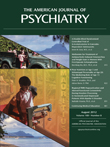Increased Amygdala Responses to Sad But Not Fearful Faces in Major Depression: Relation to Mood State and Pharmacological Treatment
Abstract
Objective:
Increased amygdala response to negative emotions seen in functional MRI (fMRI) has been proposed as a biomarker for negative emotion processing bias underlying depressive symptoms and vulnerability to depressive relapse that are normalized by antidepressant drug treatment. The purpose of this study was to determine whether abnormal amygdala responses to face emotions in depression are related to specific emotions or change in response to antidepressant treatment and whether they are present as a stable trait in medication-free patients in remission.
Method:
Sixty-two medication-free unipolar depressed patients (38 were currently depressed, and 24 were in remission) and 54 healthy comparison subjects underwent an indirect face-emotion processing task during fMRI. Thirty-two currently depressed patients were treated with the antidepressant citalopram for 8 weeks. Adherence to treatment was evaluated by measuring citalopram plasma concentrations.
Results:
Patients with current depression had increased bilateral amygdala responses specific to sad faces relative to healthy comparison subjects and nonmedicated patients in stable remission. Treatment with citalopram abolished the abnormal amygdala responses to sad faces in currently depressed patients but did not alter responses to fearful faces.
Conclusions:
Aberrant amygdala activation in response to sad facial emotions is specific to the depressed state and is a potential biomarker for a negative affective bias during a depressive episode.



